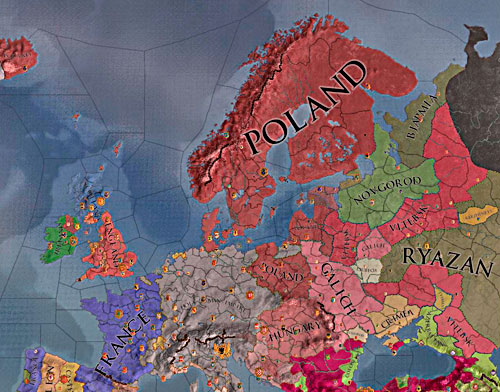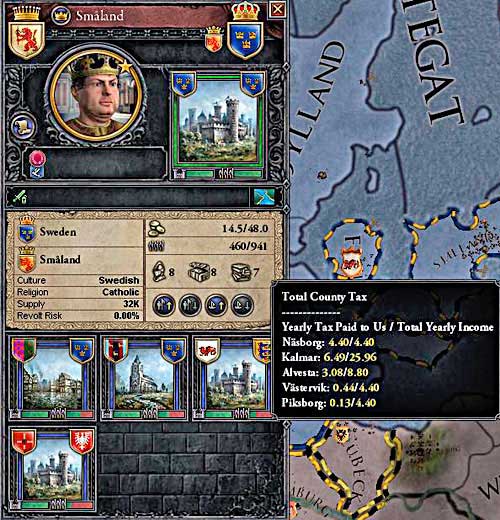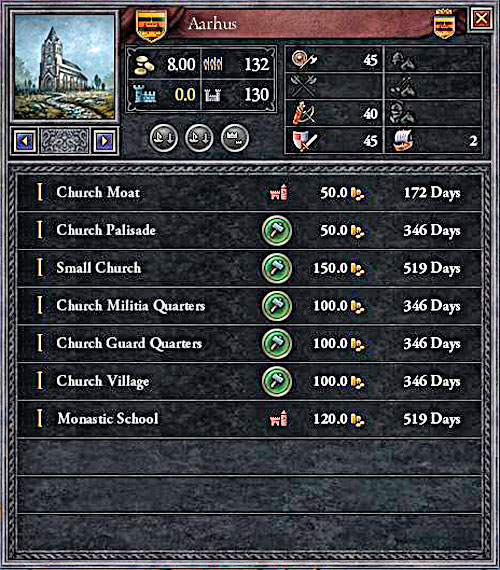Crusader Kings 2: Basics Economy
Player has only three resources (money, prestige, piety), he doesn't have to care much about the development of the infrastructure, because this is mainly vassals' task. This general view is very simplified, and because of that it doesn't let you to advanced management. As it turns out, economic issues are presented in a curious and complex way. All of your lands can be developed by not only building new structures like cities, castles and churches but also by upgrading the existing ones (for example with walls or marketplace). Also technological level of particular land matters, because only adequately advanced lands can be developed. What is important, your incomes will be different depending on how well expanded particular province is and what is a relation between you and land-owners. Also the land's steward affects this (e.g. bishops are not good in managing castles). Also number of middlemen and natural conditions are important! So as you can see, economical issues aren't as easy, as you may thought.

I should begin from the fact, that the only one source of your income are counties (duchies, kingdoms and empires don't generate an income). Admittedly, some lower level structures (cities, castles and churches) gives you some money, but it's not a sufficient amount. For instance king possessing a village will neglect it and gain only a small percent of incomes which would earn a mayor (proper steward).
It has to be noticed that crucial thing is having as many counties as you can. They give you moneys thanks to which you can function deftly. You should be careful and not cross the demesne size, because if you do, the income will decrease.
Of course dukes also gain some part of subjects' incomes but only if they're not kings. If you're a monarch, the duchies give no real income besides the prestige. Underline once again: kings do not gain any moneys thanks to the duchies and kingdoms.

But whatever you may look, the gold is only one resource. What about others?
A number and quality of your lands has almost zero meaning for piety points but it matters greatly for the prestige. Every estate generates some points of prestige monthly (the bigger land, the more points). In practice it means that kingdoms give more than duchies and those give more than the counties. Also how much particular land is depended on the player matters: those directly yours will produce more prestige than those which are indirect (e.g. you're a king but the particular county belongs to your subordinate count). Although, creating kingdoms or duchies from the counties isn't always profitable. The more land you have, the more dissatisfied and desired for the estates your subjects become. And this affects not only income but also safety of the country. That's why it's good to limit an amount of higher titles you have to minimum. For instance, being a king of Poland you shouldn't create the Lithuanian kingdom from your terrain on the east, because they're depended on you as a matter of fact. It would be profitable if there was no chance for rebellion or you were going to share your domain on two equal parts (e.g. for your sons).

Piety, the third resource, is generated by the interaction with the people of the Church. The most of it you may gain thanks to the crusades, fighting with infidels and land distribution for clergy. In this last case you must be careful, because bishops have their own politics and if you don't have a investiture law you won't be able to nominate them by yourself (what opens you on the external influences).
You are not permitted to copy any image, text or info from this page. This site is not associated with and/or endorsed by the developers and the publishers. All logos and images are copyrighted by their respective owners.
Copyright © 2000 - 2026 Webedia Polska SA for gamepressure.com, unofficial game guides, walkthroughs, secrets, game tips, maps & strategies for top games.
